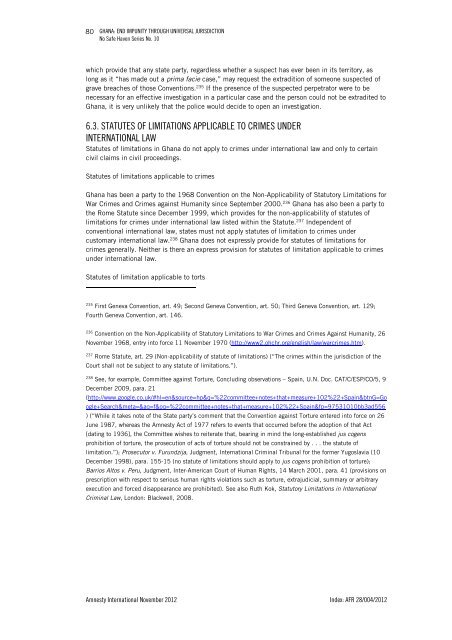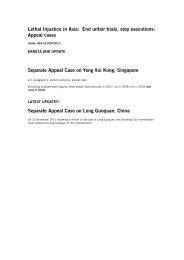Ghana - Amnesty International
Ghana - Amnesty International
Ghana - Amnesty International
Create successful ePaper yourself
Turn your PDF publications into a flip-book with our unique Google optimized e-Paper software.
80GHANA: END IMPUNITY THROUGH UNIVERSAL JURISDICTIONNo Safe Haven Series No. 10which provide that any state party, regardless whether a suspect has ever been in its territory, aslong as it “has made out a prima facie case,” may request the extradition of someone suspected ofgrave breaches of those Conventions. 235 If the presence of the suspected perpetrator were to benecessary for an effective investigation in a particular case and the person could not be extradited to<strong>Ghana</strong>, it is very unlikely that the police would decide to open an investigation.6.3. STATUTES OF LIMITATIONS APPLICABLE TO CRIMES UNDERINTERNATIONAL LAWStatutes of limitations in <strong>Ghana</strong> do not apply to crimes under international law and only to certaincivil claims in civil proceedings.Statutes of limitations applicable to crimes<strong>Ghana</strong> has been a party to the 1968 Convention on the Non-Applicability of Statutory Limitations forWar Crimes and Crimes against Humanity since September 2000. 236 <strong>Ghana</strong> has also been a party tothe Rome Statute since December 1999, which provides for the non-applicability of statutes oflimitations for crimes under international law listed within the Statute. 237 Independent ofconventional international law, states must not apply statutes of limitation to crimes undercustomary international law. 238 <strong>Ghana</strong> does not expressly provide for statutes of limitations forcrimes generally. Neither is there an express provision for statutes of limitation applicable to crimesunder international law.Statutes of limitation applicable to torts235First Geneva Convention, art. 49; Second Geneva Convention, art. 50; Third Geneva Convention, art. 129;Fourth Geneva Convention, art. 146.236Convention on the Non-Applicability of Statutory Limitations to War Crimes and Crimes Against Humanity, 26November 1968, entry into force 11 November 1970 (http://www2.ohchr.org/english/law/warcrimes.htm).237Rome Statute, art. 29 (Non-applicability of statute of limitations) (“The crimes within the jurisdiction of theCourt shall not be subject to any statute of limitations.”).238See, for example, Committee against Torture, Concluding observations – Spain, U.N. Doc. CAT/C/ESP/CO/5, 9December 2009, para. 21(http://www.google.co.uk/#hl=en&source=hp&q=%22committee+notes+that+measure+102%22+Spain&btnG=Google+Search&meta=&aq=f&oq=%22committee+notes+that+measure+102%22+Spain&fp=97531010bb3ad556) (“While it takes note of the State party’s comment that the Convention against Torture entered into force on 26June 1987, whereas the <strong>Amnesty</strong> Act of 1977 refers to events that occurred before the adoption of that Act[dating to 1936], the Committee wishes to reiterate that, bearing in mind the long-established jus cogensprohibition of torture, the prosecution of acts of torture should not be constrained by . . . the statute oflimitation.”); Prosecutor v. Furundzija, Judgment, <strong>International</strong> Criminal Tribunal for the former Yugoslavia (10December 1998), para. 155-15 (no statute of limitations should apply to jus cogens prohibition of torture);Barrios Altos v. Peru, Judgment, Inter-American Court of Human Rights, 14 March 2001, para. 41 (provisions onprescription with respect to serious human rights violations such as torture, extrajudicial, summary or arbitraryexecution and forced disappearance are prohibited). See also Ruth Kok, Statutory Limitations in <strong>International</strong>Criminal Law, London: Blackwell, 2008.<strong>Amnesty</strong> <strong>International</strong> November 2012 Index: AFR 28/004/2012
















